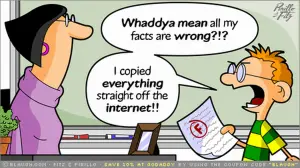 In “Defining new literacies in curricular practice” by Ladislaus M. Semali (Reading online, vol. 5, no. 4), the author debates the importance of having a definition of “new literacies” in a world where it is very difficult to predict what new literacies we will be exposed to in just a few years. The author refers to “new literacies” as those literacies that have emerged in the post-typographic era. He advocates that schools have to change their curriculum in such a way as to adapt to the new literacies, which now include, alongside printed text, moving images and graphics.
In “Defining new literacies in curricular practice” by Ladislaus M. Semali (Reading online, vol. 5, no. 4), the author debates the importance of having a definition of “new literacies” in a world where it is very difficult to predict what new literacies we will be exposed to in just a few years. The author refers to “new literacies” as those literacies that have emerged in the post-typographic era. He advocates that schools have to change their curriculum in such a way as to adapt to the new literacies, which now include, alongside printed text, moving images and graphics.
Key points:
1) In most schools, education inside the classroom is print based, while outside the school, students interact with technology that requires different competencies than those acquired at school. Thus, the need for teachers and schools to incorporate new literacy skills in the curriculum is paramount.
2) The most frequent new literacies in post-typographic era are:
– computer literacy (ability to use computers)
– information literacy (“ability to create, disseminate and retrieve information quickly”)
– media literacy (“ability to access, experience, evaluate and produce media products”)
– television literacy or “teleliteracy” (ability “to read and interpret television messages”)
– visual literacy (ability to read and interpret visual messages)
3) Schools need to create “media literate citizens” that can not only access and read the new literacies, but also create content for them (as opposed to the “passive citizens”)
4) Creating an absolute definition to a term as wide as new literacies is unwanted in a world of constant change and evolution.
Reflections:
– The need of a curriculum that includes competencies for new literacies might be a hot topic in developed countries, but developing countries, such as Thailand, haven’t reached a high enough standard of education (primary, secondary and high school only) to think about new literacies. It is very difficult to make school administrators (and parents!) understand that English doesn’t mean only grammar, or science doesn’t mean only memorization of definitions.
Question: In this context, how can one implement new literacies in a curriculum that is already overcrowded and especially one that lacks emphasis on basic literacy skills?
Tentative answer: start small, present benefits and hopefully extend.

